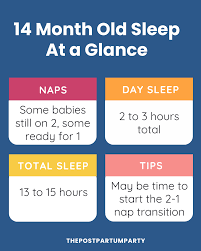Learn everything about the 14 Month Old Sleep Regression, its symptoms, causes, treatment options, and expert insights to help your toddler sleep better.
Table of Contents
14 Month Old Sleep Regression: Comprehensive Guide
Introduction
Definition of Sleep Regression Sleep regression is a period when a baby or toddler, who previously slept well, suddenly starts waking frequently at night and refusing naps. These regressions are temporary phases linked to developmental milestones.
Importance of Understanding Sleep Regressions Understanding sleep regressions helps parents manage expectations and implement strategies to help their child return to better sleep patterns.
Overview of the 14 Month Old Sleep Regression The 14-month sleep regression is particularly challenging as it coincides with significant developmental milestones and increased separation anxiety.

Types and Categories 14 Month Old Sleep Regression
Types of Sleep Regressions by Age
- 4-Month Sleep Regression: Often the first major regression, linked to the baby’s changing sleep cycles.
- 8-10 Month Sleep Regression: Associated with crawling and standing, leading to more mobility-related wakefulness.
- 12-Month Sleep Regression: Often related to the baby’s first birthday and developmental changes.
- 14-Month Sleep Regression: Focus of this article, linked to walking and separation anxiety.
- 18-Month Sleep Regression: Often related to the onset of more complex emotions and resistance to napping.
Differences Between Night Wakings and Sleep Regression Night wakings are common and can occur due to various reasons, while sleep regression is a more prolonged phase with frequent disturbances.
Symptoms and Signs
Common Symptoms
- Increased Night Wakings: Babies wake up more frequently and have trouble falling back asleep.
- Difficulty Falling Asleep: Longer bedtime routines with resistance to falling asleep.
- Shorter Nap Times: Reduced duration of daytime naps.
- Increased Fussiness: More irritability and crankiness during the day.
Uncommon Symptoms
- Night Terrors: Episodes of intense crying or fear during sleep.
- Refusal to Nap: Complete refusal to take naps, leading to overtiredness.
Causes and Risk Factors 14 Month Old Sleep Regression
Developmental Milestones
- Walking and Motor Skills: Increased mobility and exploration can disrupt sleep patterns.
- Language Development: Cognitive leaps can lead to more active and disrupted sleep.
Separation Anxiety Around 14 months, babies often experience heightened separation anxiety, causing them to wake up seeking comfort.
Changes in Routine Any changes in daily routine, such as starting daycare or family travel, can disrupt sleep patterns.
Health Issues 14 Month Old Sleep Regression
- Teething: Pain from emerging teeth can cause night wakings.
- Illnesses: Common colds or ear infections can interfere with sleep.
Diagnosis and Tests
Identifying Sleep Regression Recognizing a pattern of disrupted sleep that lasts for several weeks can help identify a sleep regression.
When to See a Pediatrician If sleep issues persist beyond a few weeks or are accompanied by other health concerns, it’s advisable to consult a pediatrician.
Tools and Methods for Tracking Sleep Patterns Using sleep trackers or keeping a sleep diary can help identify patterns and triggers for sleep disturbances.

Treatment Options 14 Month Old Sleep Regression
Establishing a Consistent Bedtime Routine A predictable bedtime routine helps signal to the baby that it’s time to wind down and sleep.
Sleep Training Techniques 14 Month Old Sleep Regression
- Cry It Out Method: Allowing the baby to self-soothe and fall asleep independently.
- Gentle Sleep Training: Gradually reducing parental intervention to encourage self-soothing.
Managing Separation Anxiety Incorporating comforting bedtime rituals and gradually reducing presence can help ease separation anxiety.
Adjusting Nap Schedules Ensuring naps are well-timed to avoid overtiredness while maintaining a consistent schedule.
Comfort Measures for Teething Providing teething toys or pain relief methods can help alleviate discomfort and improve sleep.
Preventive Measures 14 Month Old Sleep Regression
Maintaining a Consistent Routine Consistency in daily and bedtime routines helps regulate the baby’s internal clock.
Creating a Sleep-Friendly Environment A dark, quiet, and cool environment can promote better sleep.
Monitoring Developmental Milestones Being aware of and supporting developmental milestones can help manage sleep disruptions.
Keeping a Sleep Diary Tracking sleep patterns and behaviors can provide insights and help in adjusting routines as needed.
Personal Stories or Case Studies 14 Month Old Sleep Regression
Case Study 1: Successful Sleep Training A family shares their experience and methods for overcoming the 14-month sleep regression through sleep training.
Case Study 2: Overcoming Night Terrors Insights from parents who managed their child’s night terrors and improved sleep.
Case Study 3: Managing Sleep Regression During Illness A look at how one family navigated sleep regression while dealing with a prolonged illness.

Signs of Sleep Regression in 14 to 16 Month Olds
Here are some indicators of a sleep regression in children aged 14 to 16 months: Your 14-month-old is waking up in the middle of the night when they previously slept through. Your 15-month-old starts crying as soon as you begin the bedtime routine. Your 16-month-old takes longer than 20 minutes to fall asleep at bedtime or during nap time.
14 Month Old Sleep Schedule
At 14 Month Old Sleep Regression, your toddler’s sleep schedule will typically consist of the following:
Nighttime Sleep 14 Month Old Sleep Regression
- Duration: 11 to 12 hours
- Typical Bedtime: Between 7:00 PM and 8:00 PM
- Typical Wake Time: Between 6:00 AM and 7:00 AM
Daytime Naps
- Number of Naps: 1 to 2 naps per day
- Total Nap Duration: 2 to 3 hours
Example Schedule
- Morning Wake Up: 6:30 AM
- Breakfast: 7:00 AM
- Morning Nap (if still taking two naps): 9:30 AM – 10:30 AM
- Lunch: 12:00 PM
- Afternoon Nap: 1:00 PM – 3:00 PM
- Dinner: 5:30 PM
- Bedtime Routine: 6:30 PM (includes activities like bath, storytime, brushing teeth)
- Bedtime: 7:00 PM
Tips for a Healthy Sleep Schedule 14 Month Old Sleep Regression
- Consistent Routine: Keep a regular sleep and nap schedule to help regulate your toddler’s internal clock.
- Sleep-Friendly Environment: Ensure the sleep environment is dark, quiet, and cool.
- Bedtime Routine: Establish a calming bedtime routine to signal that it’s time to sleep.
- Monitor Wake Windows: At this age, wake windows (the time your child is awake between sleep periods) should be about 3-4 hours to prevent overtiredness.
By maintaining a consistent schedule and sleep environment, your 14-month-old will be more likely to get the rest they need for healthy growth and development.
14 Month Old Waking Up at Night Crying
It can be distressing when your 14-month-old wakes up at night crying. Here are some common reasons and tips for addressing this issue:
Common Reasons
- Separation Anxiety: At this age, toddlers often experience heightened separation anxiety and may wake up seeking comfort from their parents.
- Developmental Milestones: Learning to walk and talk can lead to increased night wakings as your toddler processes new skills.
- Teething: Emerging teeth can cause discomfort and pain, leading to nighttime wake-ups.
- Illness: Common colds, ear infections, or other illnesses can disrupt sleep.
- Changes in Routine: Any significant changes in your child’s daily routine, such as starting daycare or traveling, can affect their sleep patterns.
Tips to Help Your Toddler Sleep Better 14 Month Old Sleep Regression
- Consistent Bedtime Routine: Establish a calming and consistent bedtime routine to signal that it’s time to sleep. This could include activities like a warm bath, reading a story, and cuddling.
- Comfort Measures: Provide comfort items like a favorite blanket or stuffed animal. If teething is the issue, consider using teething toys or appropriate pain relief.
- Check the Sleep Environment: Ensure the room is dark, quiet, and cool. Consider using a white noise machine to help soothe your toddler back to sleep.
- Respond to Night Wakings Calmly: When your child wakes up crying, respond calmly and reassure them without making it a prolonged interaction. This helps them understand that nighttime is for sleeping.
- Sleep Training: If night wakings are frequent, you might consider sleep training methods. Gentle sleep training techniques can help your toddler learn to self-soothe and fall back asleep independently.
- Monitor Daytime Sleep: Make sure your child is getting the right amount of nap time during the day. Too little or too much daytime sleep can affect nighttime sleep.
By understanding the potential causes and implementing consistent strategies, you can help your 14-month-old develop better sleep habits and reduce nighttime wake-ups.
14 Month Sleep Regression and Leap 9
The 14-month sleep regression often coincides with Leap 9 in a child’s developmental progress, leading to disrupted sleep patterns and increased wakefulness. Here’s what you need to know:
What is Leap 9?
Leap 9, part of the Wonder Weeks, occurs around 14 Month Old Sleep Regression and is characterized by significant cognitive and physical developments. During this leap, toddlers start to understand sequences and cause-and-effect relationships, which can impact their sleep.
Common Symptoms of Leap 9
- Increased Night Wakings: Your toddler may wake up more frequently during the night.
- Difficulty Falling Asleep: Bedtime routines might become more challenging.
- Shorter Naps: Daytime naps may be shorter or more irregular.
- Increased Clinginess: Separation anxiety can peak, leading to a need for more parental comfort.
- Irritability and Mood Swings: Your toddler may become more easily frustrated or upset.

Why is My 14 Month Old Sleep Regression Experiencing Sleep Regression During Leap 9?
- Cognitive Development: New cognitive skills, like understanding sequences, can lead to an overactive mind at bedtime.
- Physical Milestones: Advancements in walking and other motor skills can cause disruptions as your toddler practices these new abilities.
- Separation Anxiety: Increased awareness of separation can make your child more anxious about being alone at night.
- Teething: Ongoing teething discomfort can also contribute to night wakings.
Tips to Manage Sleep Regression During Leap 9
- Maintain a Consistent Routine: Stick to a predictable daily and bedtime routine to provide stability.
- Provide Comfort: Offer extra comfort and reassurance during this challenging period. A favorite blanket or stuffed animal can be soothing.
- Create a Sleep-Friendly Environment: Ensure the room is dark, quiet, and cool. Consider using white noise to block out any disruptive sounds.
- Be Patient and Consistent: Understand that this is a temporary phase. Stay consistent with your responses to night wakings to help your toddler adjust.
- Adjust Nap Schedules: Monitor and adjust nap times to ensure your child is not overtired, which can exacerbate night wakings.
By recognizing the link between Leap 9 and the 14 Month Old Sleep Regression, and by implementing strategies to manage these changes, you can help your toddler navigate this developmental phase with more ease and better sleep.
How to Handle 14 Month Old Sleep Regression
Managing a 14 Month Old Sleep Regression can be challenging, but with consistent strategies, you can help your toddler get back to better sleep patterns. Here are some effective ways to handle this phase:
1. Establish a Consistent Bedtime Routine 14 Month Old Sleep Regression
- Predictability: Create a predictable routine that signals to your child that bedtime is approaching. This could include a bath, brushing teeth, reading a book, and a lullaby.
- Calming Activities: Engage in calming activities to help your toddler wind down. Avoid stimulating activities or screen time close to bedtime.
2. Create a Sleep-Friendly Environment
- Dark Room: Ensure the room is dark, using blackout curtains if necessary.
- White Noise: Use a white noise machine to drown out background noises.
- Comfortable Temperature: Keep the room at a comfortable temperature to promote restful sleep.
3. Be Consistent with Responses
- Night Wakings: When your child wakes up at night, respond calmly and consistently. Avoid lengthy interactions that could encourage further wakefulness.
- Reassurance: Offer comfort and reassurance, but try to avoid picking up your child unless absolutely necessary.
4. Address Separation Anxiety
- Comfort Objects: Provide a favorite blanket or stuffed animal to help your child feel secure.
- Brief Reassurance: If your toddler is experiencing separation anxiety, offer brief reassurance without prolonging the interaction.
5. Adjust Nap Schedules
- Monitor Daytime Sleep: Ensure your child is getting the right amount of daytime sleep. Too little or too much can impact nighttime sleep.
- Consistent Naps: Try to maintain consistent nap times to regulate your child’s sleep schedule.
6. Consider Developmental Needs
- Physical Activity: Allow plenty of time for physical activity during the day to help tire your toddler out.
- Mental Stimulation: Engage in age-appropriate activities that stimulate cognitive development without overstimulating close to bedtime.
7. Teething Relief
- Pain Management: If teething is causing discomfort, consider appropriate teething remedies such as teething toys or consulting your pediatrician for pain relief options.
8. Stay Patient and Positive
- Temporary Phase: Remember that sleep regressions are typically temporary. Patience and consistency are key.
- Self-Care: Take care of yourself as well. Ensuring you’re well-rested and managing stress will help you handle the sleep regression more effectively.
By implementing these strategies, you can help your 14 Month Old Sleep Regression navigate the sleep regression phase and develop healthier sleep habits.
14 Month Old Sleep Regression and Separation Anxiety
Separation anxiety is a common issue that can contribute to sleep regression in 14-month-olds. Here’s how you can manage it effectively:
Understanding Separation Anxiety
At 14 Month Old Sleep Regression, toddlers become more aware of their surroundings and the people in their lives. This increased awareness can lead to anxiety when they are separated from their parents, especially at bedtime.
Signs of Separation Anxiety
- Crying at Bedtime: Your toddler may cry or protest when you leave the room.
- Night Wakings: Frequent wake-ups during the night, often accompanied by crying for a parent.
- Clinginess: Increased clinginess during the day, not wanting to be separated from you.
Tips to Manage Separation Anxiety 14 Month Old Sleep Regression
- Consistent Bedtime Routine
- Establish a calming and predictable bedtime routine that helps your child feel secure.
- Include activities like a warm bath, reading a story, and cuddling.
- Comfort Objects
- Provide a favorite blanket, stuffed animal, or a piece of your clothing to offer comfort.
- These objects can help your child feel secure even when you are not in the room.
- Gradual Separation
- Practice gradual separation during the day to help your toddler get used to being apart from you.
- Start with short periods and gradually increase the duration.
- Brief Reassurance
- If your child wakes up at night, offer brief reassurance without extended interactions.
- Use a soothing voice and gentle touch to comfort them, but avoid picking them up unless necessary.
- Stay Calm and Positive
- Your child can sense your emotions, so try to stay calm and positive during bedtime routines.
- Offer reassurance with a confident and soothing demeanor.
- Nightlight and White Noise
- Consider using a nightlight to provide a sense of security in the dark.
- A white noise machine can help create a calming environment and drown out any disturbing noises.
- Stay Consistent
- Consistency is key in managing separation anxiety. Stick to the same bedtime routine and responses to night wakings.
- Over time, your child will learn to feel secure and comfortable with the routine.
- Encourage Independence
- During the day, encourage independent play and activities that boost your child’s confidence.
- Praise their efforts to play and explore on their own.
By understanding and addressing separation anxiety, you can help ease your 14 Month Old Sleep Regression and create a more restful environment for both of you. Patience and consistency are crucial during this phase.

Expert Insights 14 Month Old Sleep Regression
Pediatrician’s Advice on Sleep Regression A pediatrician discusses the common causes and treatments for sleep regressions.
Child Psychologist’s Tips on Managing Anxiety Strategies from a child psychologist on how to address separation anxiety.
Sleep Consultant’s Guide to Better Sleep Professional advice from a sleep consultant on establishing healthy sleep habits.
Conclusion
Summary of Key Points An overview of the causes, symptoms, and treatments for the 14 Month Old Sleep Regression.
Encouragement for Parents Reassurance that sleep regressions are temporary and that consistency will lead to improved sleep.
Resources for Further Education Suggestions for books, websites, and professionals to consult for more information on managing sleep regressions. if you need more information 14 Month Old Sleep Regression Visit Site, The insider View>…
FAQ’S
Is there a sleep regression at 14 Month Old Sleep Regression?
Yes, there is a sleep regression that can occur around 14 months old. During this time, toddlers often experience disruptions in their sleep patterns due to developmental milestones, increased separation anxiety, and other factors such as teething or changes in routine.
Why is my 14 month old suddenly waking up at night?
Your 14-month-old might be waking up at night due to several reasons. Developmental milestones such as walking and talking can lead to increased nighttime awakenings. Additionally, separation anxiety often peaks around this age, causing them to seek comfort and reassurance. Other potential factors include teething pain, illness, or changes in their daily routine.
What is the sleep pattern for a 14 month old?
A typical sleep pattern for a 14-month-old includes about 11 to 12 hours of sleep at night and 1 to 2 naps during the day, totaling approximately 2 to 3 hours. However, during sleep regressions, these patterns can become disrupted, resulting in more frequent night wakings and difficulties with naps.
Can you sleep train a 14 month old?
Yes, you can sleep train a 14-month-old. Various methods, such as the Cry It Out method or Gentle Sleep Training, can be effective. The key is to establish a consistent bedtime routine and create a sleep-friendly environment. It’s important to be patient and consistent while implementing sleep training techniques to help your toddler develop healthy sleep habits.




